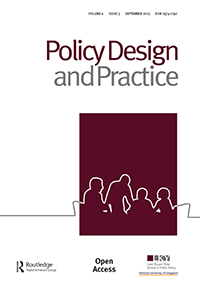Public deliberation and policy design
IF 2.6
Q1 PUBLIC ADMINISTRATION
引用次数: 7
Abstract
Abstract What role can deliberative democracy mechanisms perform in relation to policy design? This article reports findings from an experiment which was conducted to answer that question. The experiment brought together a random sample of the public who debated public policy questions online and face-to-face. Three key findings emerged. First, deliberative democracy mechanisms are different from more typical participatory policy design tools because they offer something more dynamic than a ‘snapshot’ of public opinion. Second, public deliberation can contribute evidence to policy analysis processes that is more considered because it emerges from a process of citizen sensemaking. Finally, unique forms of policy relevant data can be produced by analyzing the justifications that citizens use to convince others during policy deliberations. These findings suggest that allowing citizens to “talk policy” through deliberative democracy mechanisms can produce unique forms of policy knowledge.公众审议和政策设计
协商民主机制在政策设计中能够发挥怎样的作用?本文报告了一项实验的结果,该实验是为了回答这个问题而进行的。这个实验随机抽取了一些公众样本,他们在网上和面对面地讨论公共政策问题。三个主要发现浮出水面。首先,协商民主机制不同于更典型的参与性政策设计工具,因为它们提供的东西比公众舆论的“快照”更具动态性。其次,公众审议可以为政策分析过程提供证据,而政策分析过程受到更多的考虑,因为它来自公民的意义制定过程。最后,通过分析公民在政策审议过程中用来说服他人的理由,可以产生独特形式的政策相关数据。这些发现表明,允许公民通过协商民主机制“谈论政策”可以产生独特的政策知识形式。
本文章由计算机程序翻译,如有差异,请以英文原文为准。
求助全文
约1分钟内获得全文
求助全文
来源期刊

Policy Design and Practice
PUBLIC ADMINISTRATION-
CiteScore
10.30
自引率
4.30%
发文量
19
审稿时长
13 weeks
期刊介绍:
 求助内容:
求助内容: 应助结果提醒方式:
应助结果提醒方式:


